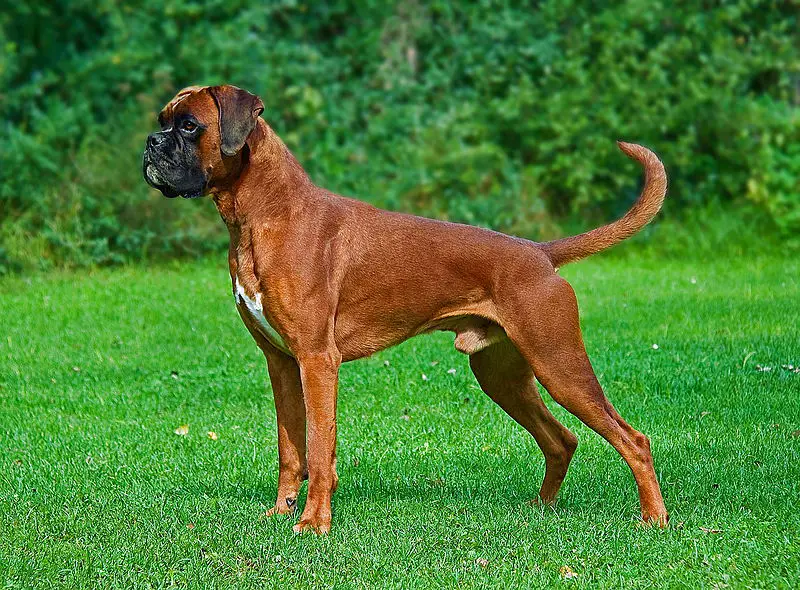To start, caring for dogs while having kids can be really tough, especially for the bigger breeds; moving with that a common question that some people may ask follows as are Boxers good with kids?
The Boxer has been gaining traction and popularity over the years for individuals and families that may want one from topping polls and surveys. According to the American Kennel Club, by 2018 it was the 11th most popular breed in the United States.
It is a lifetime commitment to adopt a pet, and the first responsible thing to do is to understand whether a specific breed is good to keep for you and your family and whether you will be able to maintain having such a breed.

Appearance
To put their looks in profile, Boxers are medium to large-sized dogs that are normally seen with fawn short-haired coat, with black ended white masks on their snouts and body. Around 20%~ of Boxers have a completely white coat however this is not albino or a genetic defect. It is just less seen.
They typically stand at around 22in. – 24in., and ideally would weigh 50lbs – 65lbs for females and 65lbs – 80lbs for males.
This breed is like familiar ones like pugs and bulldogs with their short, squashed snouts (faces), droopy eyes, and floppy eyes. They also carry a strong defensive stance and are generally muscular.
Origin
The Boxer is a mix of the extinct Bullenbeisser and the Old English Bulldog. Noting this, there is no proven theory as to where the name “Boxer” came from. They were originally bred for bull-baiting, in respect to their predecessors, and as a mix was made around 1895 and was formally recorded by 1904 in Munich, Germany; the first-ever listed Boxer being Mühlbauer’s Flocki. The fun part of the start of the Boxer breed was the start of the Boxer Clubs, which focused on regularly held dog shows that showcased the crème de la crème amongst all the dog candidates.
Temperament
They are highly intelligent with goofy energy, and they require a lot of exercises otherwise they become restless (and possibly destroy some furniture on the side). They’re generally not a talkative breed so in the case that they bark or vocally show signs of agitation, it is best to be alert. The high energy may be a bit alarming for first time owners, but its intelligent nature will help keep the dog in check in family settings.
Boxers as a breed are territorial and loyal, and they do crave companionship, so it’s a good idea to be the doting type. It is also best to note that they prefer temperate conditions and are highly intolerant of heat. A lot of Boxers would be able to adapt to the urban and rural areas equally, given those conditions.
Nutrition
These types of dogs require a lot of protein and general nutrients. They need to eat a lot, as they tend to exert a lot of the energy readily from their daily activities. Speedy and excessive consumption of food, as they – along with similar larger dogs – have the tendency to eat way too fast causing gastric dilation or general stomach distress.
It is advisable to avoid artificial flavourings as they may contain allergens. Optimally it is best to ask a vet for the right kind of mix for a specific pet.
Some veterinarians would recommend raw food under some circumstances, but often they’d recommend what is readily available as raw food is packaged and expensive. There are still other options especially for puppies, so feeding them and learning options to keep them healthy should be no problem.
Just remember to try to be creative when it comes to gastric distress! That will be tackled later.
Grooming
The Boxer is a naturally clean breed, with their short hair making it easy to clean them. Similar to cats, this breed is known to do their own form of sanitation by licking themselves clean – however, if one chooses to maintain a deeper cleansing of their loveable pet, they can proceed with using a clean brush off their coat every week.
Any vet-approved soap would be ideal, and some soft and subtle brushing so that there would be no major stress towards the breed would also be advisable. Some training for bathing consists of conditioning them through slowly dripping water until they are later on more accustomed to the faster flow. The scrubbing can come along at that point.

Training
They are easy to train due to their high intelligence. They have been a fond subject for dog shows and are good candidates as protection or service dogs. The standard methods of training involve the click training, and the standard treat or no treat conditioning, To reiterate, Boxers adapt and learn pretty quickly so training will not be a problem.
As much as possible the dog should be given as much exercise as they can, as they destroy furniture otherwise. They cannot stay neglected and crave company and will react negatively under such conditions.
Boxers may seem like the fighting kind but they also have those sensibilities. Try to give them as much time as their energy can spike them to have terrible moods, and could lead to a depressive mood that makes them unresponsive to commands. There is a compromise into owning intelligent dogs as well.
Health
With the lifespans typical of dogs their size, you’d feel you’d have some resilience. However, despite the lovely companionship that the Boxer provides, there are still things they have to endure. They are especially prone to the following illnesses:
- Boxer Cardiomyopathy
From growing erratic heartbeats, this is a genetic disease that could be fatal. The symptoms can range from fainting, liquid in the abdomen, up to death if left untreated. Owners should not hesitate to take their pets to the vet should there by any signs of distress.
- Cancer
This could be prevalent among older dogs of varying breeds; sadly, Boxers are particularly prone to various cancers, especially lymphomas.
- Bloat
Also known as gastric dilation, these normally occur when our loved dogs tend to rush into eating. Gastric dilation can cause serious problems so a little training or innovation that could help them slow down is best advisable.
- Hyperthyroidism
This may come with age or general failure of endocrinal glands. This can cause depression for the pet, along with weight and hair loss.
- Hip Dysplasia
This genetic disorder is characterized by a misshapen hip socket that will make it difficult for one’s pet to walk and may permanently cause disability. This disorder may be present even starting a few months. A veterinarian can diagnose this with a usual run of x-rays, electrolyte panel, a urinalysis, blood chemical profile, and a CBC. They might amputate the limb affected if necessary.
- Degenerative Myelopathy
This disorder starts in the spinal cord and then affects the motor functions, making it difficult for our beloved pet to walk and eventually wear them from doing much at all. There is no known cure for this one.
There are innumerable health issues for dogs in general, but the mode of action bringing them to a vet immediately upon signs of distress. Remember, for what is a Boxer a good family dog breed if the family does not reciprocate in being good for the loving pet? Always seek health advice from a trusted vet!
Relationship with Children
The Boxer breed has been known as a good family companion, but is it good with kids? If trained with proper socialization with kids and pets then likely they would have no problems whatsoever.
With ideal conditions laid down, we get again to the question: is Boxer a good family dog breed?
A Summary and the Verdict
Throughout this article, we see some pros and cons to adopting a Boxer with kids.
To start with the cons, the negatives that some may want to point out is the obvious energetic vibes that may be destructive and a little overwhelming. It may be difficult for first time adopters who have no prior experience in training their own dog. Along with the prevailing possible health issues that are there.
The good parts still lie in its high intelligence which prompts it to be a ready guard dog; the playful energy can be laid low with proper training applied. They’re good for the company, especially for those who would willingly be able to spare the time. Generally, they are docile animals as much as they are territorial, especially if they have been put under proper conditions. They are very good with their proper owners and the kids as well.
In conclusion: going back to the question, are Boxers good with kids? We’d give this a definite yes. They are strong and headfast to giving time and attention, only at the cost of reciprocating with said time and also some affection. We can say that every breed has their own quirks and oddities, but as all of them have potential, Boxers are good family dogs despite what is commonly attributed to them. They are also very low maintenance when it comes to baths and is generally not needy.
They, like any other dog, should not be given the stigma of supposedly being a “bad breed.” There is no inherently bad breed, and lovingly enough the Boxer has proven that throughout the start of being a good companion for kids.
